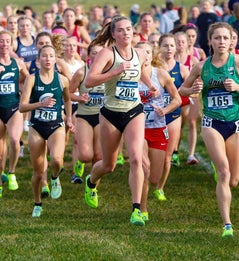I weigh XXX, the one who runs a mile in X:XX, "Ugh I still have X reps left I'll never make it". Numbers can become overbearing and can make you feel like that's all that matters. In reality there is so much more to the sport and time is merely the end goal. This piece is a little long so I broke it up into 3 different categories in case you only care about one or two of them. The first one is fueling, dealing with weight, calories, all those fun things, the second is time comparison in races, the third is counting reps and distance in workouts and races.

Fueling
At least for me, numbers were very important when it came to fueling (that was past tense but still very much a thing). They always have been. For a little backstory, I was *unintentionally* under fueling back in high school and low on iron so once I figured this out, I started eating more, and became fixated on the numbers to make sure I was eating enough since I no longer felt trust with my body and hunger cues. This wasn't necessarily unhealthy, at least in the moment but in the long run it hurt my relationship with food and the numbers became increasingly more important to me. More recently with worries about weight and more *intentional* under fueling, numbers became more comforting and something to cling on to feel some semblance of "control" with imaginary correlations. Here's a few of those examples of ways I used numbers:
- "I ate XXXX calories or X times yesterday and had a great workout today, let's repeat that and we'll get faster."
- "I weighed XXX when I PRed, we have to get back to that."
- "I ate these things before my race and ran well, that's all I can ever eat before I race."
- Subconsciously tallying calories in my head as I make a plate.
- Not getting and extra snack or second plate because I've met and imaginary quota, I set for myself.

The reason I say imaginary correlations is because they are just that. These numbers exist but the correlations do not. feeling lighter because you ate less won't make you faster, weighing less won't make you faster, there's no magic food that made you run well that one time, your caloric need is always changing day to day so why should we stay at some random caloric limit we just pulled out of nowhere?
My experience and what changed:
An example was this past January. I was having literally the best workouts of my life for two weeks straight, and at the same time, I was about 2 months into limiting myself to small portions and/or eating 3 or less times a day (which for an athlete eating 3 times a day is usually not enough), I was hungry all the time. I was told I have a bank of energy stored up from eating well in the past, so I won't feel the effects immediately, but an energy crash was coming. I didn't believe it, I felt great and was running awesome. I was frustrated because I knew I needed to prove to myself that the energy crash was coming and the only way to do that was to keep going and wait for it to happen. I wish I hadn’t, but it happened, and it was horrible I was sleeping A LOT, always in a bad mood and not able to concentrate. I wanted so badly to get back to those 2 weeks of workouts, so I started eating more, I regretted my decisions and started digging myself out of my hole. But there was still a lot of hesitation because I was confused, these imaginary correlations made so much sense, so I clung to them to get back to those awesome workouts.

There was a point where I knew these correlations were stupid things to think but also no one could convince me that they weren't real. Something I found to help with this was to challenge those thoughts. Think about why that correlation doesn't make any sense and think about the other factors that actually contributed to the performance.
I was having trouble with the correlation with what I was eating the week of those good workouts and how I was running so we broke it down. There are 3500 calories in a pound of fat, if I'm seeing a correlation from the day right before the workout, realistically the deficit could not have been even remotely close to 3500 so how could I really feel lighter? There's no way I could have even lost a pound in a single day so it’s all this illusion so there's no way the correlation is real. On top of this we need to remember weight fluctuates daily so a single pound weight fluctuation would happen regardless of restriction. You just wouldn't know because its honestly not an important detail.
One thing I was told that really stuck in my head when trying to break this correlation was "it's honestly really insulting to all your hard work to give the credit to your weight, if that was such an important detail, malnourished children in underdeveloped countries would be winning world championships. You put in so much effort training, recovering, and building fitness to give all your performance credit to a single number". I laughed when I was told this at first, because let's be honest, it is funny, but after sitting with that idea for a few days, it made sense and helped a little bit, and I keep coming back to that idea.
"So, if that's not real, why was a running so well?". My confidence was super high, and going into a workout confident can do literal wonders— something I wish I could channel daily over a more healthy reason—but we are still working on that. I also was fresh off Christmas break, so school wasn't stressful, I was also always thinking about food which meant I wasn't overthinking the workout. The list goes on and when I realized all these other factors that could be impactful, it allowed me to let go of the numbers and correlations.
Time
Running is a sport measured by time. We can't change that; however, we can change our perspective on it and realize maybe it’s not as important or the only goal. This year I got really caught up in time, since it was my second year on the team, we were running the same courses as the year before, so it was really easy to compare the year before and see I wasn't getting faster. Obviously, there are A LOT of other factors, but I choose not to believe it because all I really want is to get faster.
So, this is something I am still really bad at but there are a few things that I've done that helped. Coach always says to "focus on the effort" and "be in the now". These both help a lot to not focus on the end goal. Focusing on the effort really helps to remember that even if it’s the same race or course, the conditions may be different so you just need to focus on what you can do NOW and as long as you put 100% effort, its a success. And I guess that's also what "being in the now" helps with. Last year I would get to the point where I wasn't even excited to race because I was stressed about getting better before the gun even went off. So, using these two ideas I could focus on each run’s purpose a little bit more instead of making sure everything was perfect. Focusing on recovery during the easy run, or relaxing on the pre-meet shakeout, doing everything I could to think about the task at hand and not how it will affect the next race. These also helped in the race, focusing on catching the next move and fixing my form in the moment instead of tensing up, thinking of the result.
So, post-race I feel like it’s a little different. I mean yes you can focus on those two things and forget about the result and move on to the next run. But that is seriously way easier said than done so in my opinion that is horrible advice. I'm kind of a glass half empty person when it comes to my performances, I'm good at critiquing myself and talking about everything I wish was different. Instead, what I TRY to do (that's capitalized because I'm still bad at it) is list out the positives that happened. I really like journaling or writing out my post-race thoughts to organize and dump out of my brain to try and dwell on the race a little less. If any of you follow me on Strava, you know this to be true because I often post them there. To be honest they are really negative, but I've been trying to list the good and also what I want to do next time to get better instead of just listing the bad.
An example:
instead of "I was really nervous before the race and had to sit for my heart rate to slow, and I was tense the whole time and died at the end". I try to think "I was really nervous, so I want to focus on my pre-race stretches and breathing to calm my heart rate as a warmup. I also think I could take some deeper breaths during the race to loosen up and focus on the person in front of me. I had a really good middle and was able to make moves and stay aggressive. I died a little at the end and got passed but I think that's because I was good at being aggressive in the middle". Easy enough to write and less easy to believe and execute, I know but it’s a start, and that's where I am so I'll let you know when I figure out the next step.

Reps/Distance
For this topic, I have really similar advice as the time, but I'll share anyway. It’s really easy to get caught up in how many reps are left in a workout, and how much more of a race is left, but only thinking about that can make it worse and feel longer.
For me in workouts, especially things like Ks or mile repeats, or really anything with more than 5 reps, it’s really hard not to count down. Now the advice I would give is the same as for time, focus on your effort during each rep and be in the now by focusing on each 100m or any little part of the rep. But also, some directly applicable advice would be to just stay positive, lean on your teammates, use distraction, and whatever else to fuel your fire. Me and my teammate Payne have gotten good at this over the past year, we pride ourselves on the workout atmosphere we've fostered and wish everyone to experience what we've been able to do. So I'll summarize if you're curious:


*Yes these are both pictures with Payne, this is my time to say, I appreciate you more than you know*
Talking to each other is a big part of it, words of encouragement "stay right on my hip" or "Lead this next one, even though you're struggling, I trust you can do it", or positive affirmations and confidence building talk "We got it" or some stupid overly excited comment about the pace like "OOOOOH we are a metronome today, that lap was paced perfect" it helps make the workouts more fun and I think its mutually beneficial. Talking to each other, acknowledging it’s hard so you know you're not alone, and giving words of encouragement helps both when you say it and when you receive it. Another classic that I personally love is a good ol' fist bump. When a workout is so hard, no one can talk, a fist bump is another way to receive all the encouragement listed above. We also love distraction, sometimes focusing on the music playing, or talking about something completely random can be really helpful especially for those long workouts where you just really cannot think about how much is left.
In races it’s a little harder because you’re on your own and usually don't have a teammate around. It’s the same though, thinking positively goes such a long way. I always know that when I start doing math and fractions in my head "Okay, only 7/19th of this race to go" then I'm in a bad place and it’s about the be a longggg race. So, focusing on the positives helps, even if you’re lying to yourself "I actually feel good right now" "I'm in a good position" or "okay let’s try and catch that move". Sometimes I can use teammates in this situation, if I know Payne is in front of me, I will start looking for her and do everything I can do to catch up or if she comes up next to me, I won't let her go, because we both whole heatedly believe whatever one of us can do, the other is also capable. This is also a great side effect of the workout atmosphere we've created.
So that was a lot, but I think this is a topic that I've dealt a lot with in all 3 of these categories so I really care about it, even though I'm not awesome at dealing with them, I do have a lot to say and a lot advice to combat some of the issues so I hope you enjoyed, please let me know what you though of it!
-Emma
Add comment
Comments
Skippy, you have a way with words!